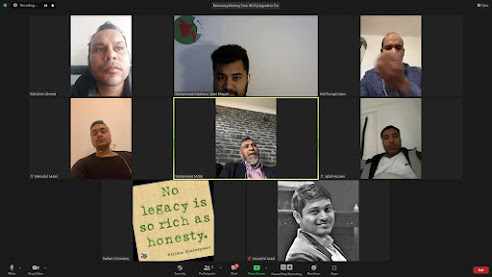Bangladesh: No Space for Dissent – Bangladesh’s Crackdown on Freedom of Expression Online
Online meeting by Amnesty International
Date: 23 August 2021 at 06:15 PM
I, Mohammad Mazharul Islam Bhayan, Chairman of London based Bangladeshi Human Rights Organisation Stand for Bangladesh, attended a Human Rights programme in the UK
organised by Amnesty International. We discussed that Bangladeshi authorities
have imprisoned at least 433 individuals under the country’s draconian Digital
Security Act (DSA), according to the country’s Department of Prisons as of 11
July 2021. Most of these prisoners or at least 185 individuals are held for
allegedly publishing offensive and false information online.
More than 1,300 cases have been filed against
about 2,000 people under Bangladesh’s draconian Digital Security Act (DSA) and
nearly 1,000 people have been arrested since the law was enacted in October
2018. An analysis of print and online news by Amnesty International shows that
more than 100 journalists have been sued under the DSA between January 2019 and
July 2021, and at least 40 of them were arrested.
The DSA, a vague and overly broad law, has
been increasingly used to stifle dissent on social media, websites, and other
digital platforms with punishments that go up to life imprisonment. The
authorities have targeted critical voices under the pretext of containing
false, offensive, derogatory or defamatory information, and it is being
deployed as a tool for repression. Amnesty International analysed a selection
of cases against 10 individuals belonging to diverse backgrounds.
The organization found that cases against
eight out of 10 individuals have been filed by lawmakers, members of the ruling
Awami League party or law enforcement officials. In all these cases,
individuals were accused of publishing posts on social media that were critical
of the government and ruling party politicians, including Bangladesh’s Prime
Minister Sheikh Hasina and the country’s de facto founding or first president
Sheikh Mujibur Rahman.
In one case, a folk musician was accused of
“hurting religious sentiment” for criticising Allah (God). Six out of 10 cases
analysed by the organization featured criminal defamation charges, where the
complainant was either a law enforcement official or someone else other than
the person said to be defamed. In those cases, the authorities also included the assumption
that social media posts by the individuals were “about to” deteriorate law and
order. Satire and criticism were treated as false, offensive or derogatory
information under the law.
A law enforcement official told Amnesty
International that it is their responsibility to contain criticism against the
government. Yet, international human rights law is clear that criticism of the
authorities can never be legitimately punished.
For more information please click on the link https://www.amnesty.org/
Also, to know more about Bangladesh please visit https://www.amnesty.org/en/latest/


Comments
Post a Comment